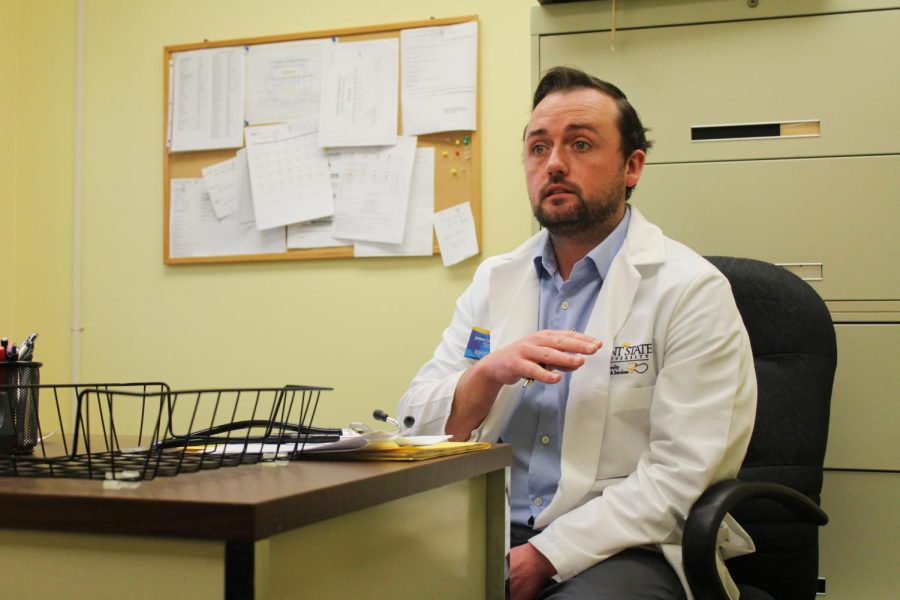Measles outbreak on campus possible, but unlikely
Nurse practitioner James Crowley of the DeWeese Health Center explains vaccinations are important for college students on Wednesday, Feb. 6, 2019.
While Kent State requires students to be vaccinated against measles, the percentage of vaccination is below what is needed to provide complete protection from a measles outbreak.
University Health Services isn’t worried, though, because Kent State’s percentage of vaccines is still strong, nurse practitioner James Crowley said.
The department is working to ensure students are receiving MMR, or measles, mumps and rubella vaccines, Crowley said.
“We work really hard to make sure everyone has their two doses,” Crowley said.
Demand for measles vaccine has surged in Washington state, where the highly contagious virus is linked to more than 50 confirmed illnesses this year — including among people who had previously shunned the shots.
As of Jan. 23, Kent State was at 88 percent compliance of its two MMR doses.
“Even if, let’s just say, 99 percent of the campus is immunized, which we work hard to do that, even that 1 percent that might have some exemption, they should still be protected by what we call herd immunity,” Crowley said.
Herd immunity is defined as “the immunity or resistance to a particular infection that occurs in a group of people when a very high percentage of individuals have been vaccinated or previously exposed to the infection,” according to dictionary.com. This means students who are exempt from the MMR vaccine have immunity to those diseases because most of the population around them is vaccinated.
The medical community considers herd immunity to be effective when 90 to 92 percent of the population has been vaccinated, Crowley said.
Due to the 88 percent compliance, Kent State is not fully protected by herd immunity, so it’s possible a measles outbreak could occur.
All Kent State students are required to show proof of receiving two MMR vaccines after the age of one, said Scott Dotterer, the coordinator of Kent State’s Office of Health Promotion.
Some students are exempt from the MMR vaccines if they provide a religious or medical excuse.
The Centers for Disease Control and Prevention reported 372 measles cases in 2018. In 2000, measles was declared eliminated in the United States.
The CDC reported 79 individual measles cases as of Jan. 31 this year.
Most people who had the measles in the CDC study were not vaccinated.
“The risk of death from measles is higher for adults and infants than for children,” according to the National Foundation for Infectious Diseases.
University Health Services recommends students get vaccinated because multiple diseases have been eliminated due to vaccines.
“When I was in fifth grade, my teacher had crutches, and she couldn’t really use her legs and that was because she had polio,” Crowley said. “Polio doesn’t exist anymore. It used to be widespread. A lot of these diseases that we vaccinate against have killed people and we (the health community) have eliminated them.”
Vaccines prevent diseases that can threaten lives and reduce the chance of spreading a disease, according to the CDC.
Multiple immunizations besides the MMR vaccine, such as meningococcal, hepatitis B and HPV vaccines, are available to students at the DeWeese Health Center, Dotterer said.
Jade Critchfield covers health and fitness. Contact her at [email protected].



